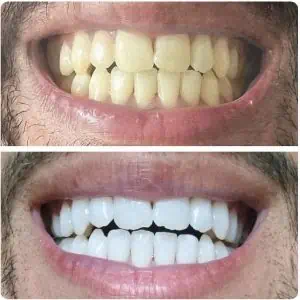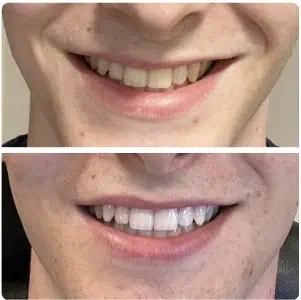If you’re looking to whiten your teeth professionally, you may consider laser teeth whitening. This teeth whitening procedure is done in-office by a dentist and uses lasers to activate the whitening chemicals in teeth whitening gel.
It’s typically a successful procedure that can provide among the strongest results of most professional whitening procedures. Keep reading to find out all about laser teeth whitening, including:
- Laser teeth whitening cost
- How long laser teeth whitening lasts
- Side effects of laser teeth whitening
- Safety of a teeth whitening laser
- Laser teeth whitening before and after reviews
We hope this article helps you figure out if this is the right whitening treatment for you.
Laser teeth whitening is one of the most efficient procedures, but with prices ranging from £400 to £1,000 also one of the pricier ones.
If you’re seeking a more affordable option, you might want to consider the Smile White teeth whitening kit. The procedure doesn’t include a laser, but it’s also very effective.
Schedule a consultation with a dentist to determine which whitening procedure is best for you.
In This Article
What is laser teeth whitening?

Laser teeth whitening is a process that involves the application of bleaching gel, activated by the radiation of a laser. The actual teeth whitening laser itself doesn’t do any bleaching. Instead, it activates the bleaching gel, heating it up and making it work faster and more effectively.
How does laser whitening work?
In scientific terms, the bleaching process takes place via photochemical activation. This is a process wherein the bleaching gel comes into contact with an energy source (laser). It increases the potential of the bleaching agent during the whitening laser treatment.
As far as what you’ll experience goes, you can more or less expect the following:
- Your dentist will place a rubber guard in your mouth to help keep it open during the procedure.
- They then apply a protective coating over your gums so that they don’t come into contact with the bleaching gel, preventing irritation and damage.
- The dentist applies the whitening gel to your teeth and activates the gel using the laser. You can expect the gel to foam, showing that it is working.
- The gel is left on your teeth for a few minutes at a time, at which point your dentist will take it off and then reapply it until the desired shade is achieved. The entire appointment can take anywhere from 30 to 90 minutes, and several appointments may be required.

Post-treatment care
After treatment, follow the instructions from your dentist, but typically you should:
- Avoid consuming highly pigmented food and drink
- Reduce consumption of acidic foods, or avoid them altogether
- Avoid smoking
- Rinse your mouth with fluoride rinses several times a day to rehydrate enamel and dentin
Whitening agents used
Carbamide peroxide and hydrogen peroxide are the most common bleaching agents used in tooth whitening treatments. Typically, the concentration of peroxide in the whitening gel that dentists use in-office is around 35% or a little more.
This can cause sensitivity, although it should be safe because your dentist will take special measures to protect your gums from the whitening gel. They may also give you something to help ease sensitivity.
In the video below, you can see how the laser teeth whitening procedure works, plus the laser teeth whitening before and after results:
Laser whitening uses
Laser teeth whitening can whiten teeth stained for a variety of reasons, including:
- General stains on enamel
- Ageing
- Smoking and stains from diet like wine and coffee
- Dental fluorosis
- Tetracycline staining
- Trauma to the dental pulp
- Restorative treatments
With tetracycline staining, professional bleaching alone may not be enough. In that case, a combination of treatments can be used, like bleaching and veneers.
Dental fluorosis may need to be treated with a combination of laser whitening and microabrasion. You can read our dedicated article to learn more about dental fluorosis here.
Laser teeth whitening isn’t for everyone
There are some cases where laser teeth whitening isn’t a good option. These include:
- Patients with decay or lesions around the tooth roots
- Pregnant patients
- People who experience lots of sensitivity
- Exposed dentin and cracks in the enamel
- Patients with large restorations in the visible part of the smile
- Elderly patients with gum recession and yellow roots

- Our #1 Teeth Whitening Kit
- Snow offers lasting results in just 9 minutes a day and satisfaction guaranteed or your money back.
- Fast Results: Noticeably whiter teeth after just one use, with full results in 21 days.
- Safe for Sensitive Teeth: Designed to be pain-free, even for those with sensitivity.
- Easy to Use: A convenient and straightforward application process.
- Celebrity Endorsed: Trusted and used by celebrities for a brighter smile.
Is laser teeth whitening safe?
Laser teeth whitening is considered safe, but because there is a high concentration of peroxide used, it can risk dehydrating teeth and causing tooth sensitivity or irritating gums.

Some would argue that laser whitening is safer than other options because they can focus the lasers on specific areas, better avoiding the gums and gum line.
That being said, lasers can harm your eyesight, so it’s essential that you only get this procedure done in-office by a dentist who is certified in the procedure. They should give you safety goggles specific to the laser used.
Laser teeth whitening side effects
All teeth whitening methods may cause discomfort. With laser bleaching, you may experience some sensitivity during treatment.
One study found that although argon lasers can cause damage to the pulpal tissue if used at energy levels over 600 J/cm2, when used at the correct energy level for teeth whitening, there is no damage to tissue or teeth enamel.
Alternatives to laser whitening
There are so many ways to whiten your teeth, including:
- Zoom teeth whitening: In-office whitening that uses an application of whitening gel and a special LED light
- Home bleaching kits: With and without LED lights, they usually come with whitening trays into which you insert the gel
- Whitening strips: An affordable and easy way to achieve slight tooth whitening; Crest and Snow are examples.
Laser teeth whitening vs Zoom
Both Zoom and laser teeth whitening are in-office procedures that are effective and safe ways to whiten your teeth. There are some differences that may help you decide which is best for you:
- Coverage: Zoom whitens all teeth at the same time for more consistency, whereas laser whitens each tooth, one at a time
- Speed: Zoom whitening is faster than laser
- Comfort: Laser whitening can be more comfortable than Zoom because Zoom treatments may last longer
- Tailored: Laser whitening can be tailored to each tooth
You can read more about Zoom teeth whitening in our complete guide here.
Laser teeth whitening vs bleaching
Tooth bleaching is an overarching term that can include many treatments, including Zoom teeth whitening, laser tooth whitening, and at-home kits — really any procedure that uses peroxide to bleach teeth! Laser whitening is a type of in-office professional tooth bleaching.
The table below shows a summary of the different alternatives to laser teeth whitening:
Laser whitening | Zoom | Home bleaching kits | Whitening strips | |
Effectiveness |
|
|
|
|
Treatment duration | 1 - 1.5 hours | 1 - 1.5 hours | 1 - 2 weeks | 1 - 2 weeks |
How long results last | Can last up to 2 years | Can last up to 2 years | Up to 1 year | Results vary |
Pros |
|
|
|
|
Cons |
|
|
|
|
How much does laser teeth whitening cost?
Laser tooth whitening prices range from £400 to £1,000 and this is one of the most expensive procedures, but it’s also one of the most effective. Zoom whitening costs less, between £400 – £850. Professional bleaching without lasers can cost between £200 – £400.
Laser teeth whitening near me
Lots of dentists offer laser teeth whitening services — you don’t even need to go to a dentist specialising in cosmetic dentistry. To find one, just search online for laser teeth whitening near me or ask your regular dental practice if they can recommend somewhere offering this service.
Conclusion
Laser teeth whitening is an effective and safe way to whiten teeth that provides similar results to other in-office professional bleaching methods. It can whiten both intrinsic and extrinsic stains, including stains from diet on the surface of the enamel, and deeper stains, like those from tetracycline or tooth trauma.
This procedure may cause some sensitivity, and is more expensive than other procedures — but depending on your needs, it may well be worth the cost!
Laser whitening | Zoom | Home bleaching kits | Whitening strips | |
Effectiveness |
|
|
|
|
Treatment duration | 1 – 1.5 hours | 1 – 1.5 hours | 1 – 2 weeks | 1 – 2 weeks |
How long results last | Can last up to 2 years | Can last up to 2 years | Up to 1 year | Results vary |
Pros |
|
|
|
|
Cons |
|
|
|
|
FAQs
Is laser teeth whitening effective?
Just like with any teeth whitening method, effectiveness will depend on various factors. Some of the most common determiners of treatment success include the following.
- Yellowish or light brown teeth with external stains are easier to bleach.
- Bluish teeth or teeth with grey stripes caused by antibiotics like tetracycline are more difficult to bleach.
- Dentin darkens with ageing, which can make bleaching more difficult.
- Dental trauma can cause darkening and is more difficult to bleach.
How long does laser teeth whitening last?
When patients follow the directions of their dentist, bleaching effects can last around two years. But keep in mind that results will vary from patient to patient and will also depend on diet.
Wiley Online Library: Dental Bleaching with LEDs and Lasers. Consulted 28th March 2022.
ResearchGate. Argon laser oral safety parameters for teeth. Consulted 28th March 2022.







